White House Lawyer Ty Cobb Stepping Down
A key coordinator in the Trump administration's dealings with Robert Mueller, his retirement comes as the president's personal legal team negotiates terms of a possible sit-down between Donald Trump and prosecutors.WASHINGTON—White House lawyer Ty Cobb will retire at the end of the month, the White House said Wednesday, further shaking up President Donald Trump’s legal team as the president intensifies his attacks on the special counsel’s Russia investigation.
Cobb, the White House point person on special counsel Robert Mueller’s investigation, informed White House chief of staff John Kelly last week that he would retire at the end of May. White House press secretary Sarah Huckabee Sanders said Cobb had been discussing the decision for “several weeks.”
Cobb did not personally represent the president, but he was a key adviser, coordinating the administration’s dealings with Mueller. His retirement comes as the president’s personal legal team has been negotiating the terms of a possible sit-down between Trump and prosecutors.
It also comes a day after one of Trump’s former personal attorneys, John Dowd, confirmed to The Associated Press that Mueller’s team in March raised the prospect of issuing a grand jury subpoena for Trump, an extraordinary idea that would seek to force a sitting president to testify under oath.
Dowd said Mueller’s team broached the subject during a meeting with Trump’s legal team while they were negotiating the terms of the possible interview with the president.
Dowd himself left Trump’s legal team more than a month ago.
It was not immediately clear in what context the possibility of a subpoena was raised or how serious Mueller’s prosecutors were about such a move. Mueller is probing not only Russian election interference and possible coordination with Trump associates but possible obstruction of justice by Trump.
Trump lashed out against the investigation in a familiar fashion Wednesday, saying on Twitter: “There was no Collusion (it is a Hoax) and there is no Obstruction of Justice (that is a setup & trap).”
Even if Mueller’s team decided to subpoena Trump as part of the investigation, the president could still fight it in court or refuse to answer questions by invoking his Fifth Amendment protection from self-incrimination.
Dowd’s comments provide a new window into the nature of the Trump lawyers’ interactions with the special counsel, whom the president has increasingly tried to undermine through public attacks.
On Tuesday, Trump said it was “disgraceful” that a list of proposed questions drafted in response to Mueller’s negotiations with the legal team was “leaked” to the news media.
The about four dozen questions were compiled by Trump’s lawyers during negotiations with Mueller’s investigators earlier this year over the prospect of a presidential interview.
A person familiar with the matter, who insisted on anonymity to discuss ongoing negotiations, told the AP that the president’s lawyers extrapolated the list of expected questions based on conversations with Mueller’s team about the topics prosecutors wanted to cover with Trump. The questions reflected what the defense lawyers anticipated Trump would be asked, rather than verbatim queries that Mueller’s team provided, the person said.
The Washington Post first reported that Mueller’s team raised the possibility of a subpoena for Trump. The New York Times first published the list of questions.
According to the list, the questions range from Trump’s motivations for firing FBI Director James Comey a year ago to contacts Trump’s campaign had with Russians. Although Mueller’s team has indicated to Trump’s lawyers that he’s not considered a target, investigators remain interested in whether the president’s actions constitute obstruction of justice and want to interview him about several episodes in office. They have not yet made a decision about an interview.
In his tweet, Trump said there were “no questions on Collusion” and, as he as many times before, called Mueller’s investigation a “Russian witch hunt.” He said collusion with the Russians “never existed.”
In a second tweet, Trump said: “It would seem very hard to obstruct justice for a crime that never happened.”
The questions do appear to indicate that Mueller is looking into possible collusion. Some touch on Russian meddling and whether the Trump campaign coordinated in any way with the Kremlin. In one question, Mueller asks what Trump knew about campaign staff, including his former campaign chairman Paul Manafort, reaching out to Moscow.
Mueller has brought several charges against Manafort already, including money laundering and bank fraud. None of the charges relates to allegations of Russian election interference and possible coordination with Trump associates, and Manafort has denied having anything to do with such an effort.
The questions also involve key moments from the early months of the Trump administration, including his reaction to Attorney General Jeff Sessions’ recusal from the Russia investigation and Trump’s firing of his national security adviser, Michael Flynn.
One question asks whether there were any efforts to reach out to Flynn “about seeking immunity or possible pardon” ahead of his guilty plea last year. Flynn is now cooperating with Mueller.
___
Associated Press writers Mary Clare Jalonick and Darlene Superville contributed to this report.
Your support matters…Independent journalism is under threat and overshadowed by heavily funded mainstream media.
You can help level the playing field. Become a member.
Your tax-deductible contribution keeps us digging beneath the headlines to give you thought-provoking, investigative reporting and analysis that unearths what's really happening- without compromise.
Give today to support our courageous, independent journalists.
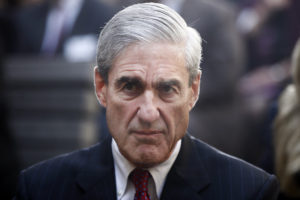
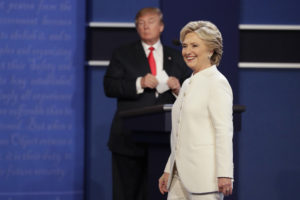
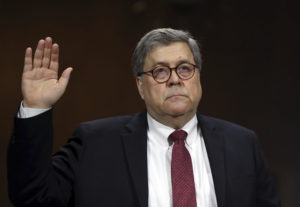
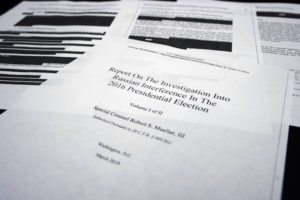
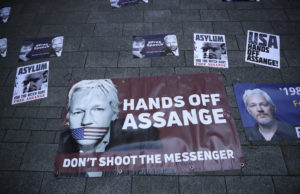
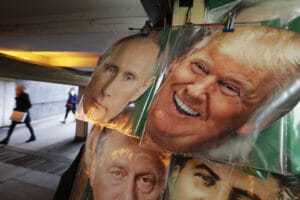
You need to be a supporter to comment.
There are currently no responses to this article.
Be the first to respond.